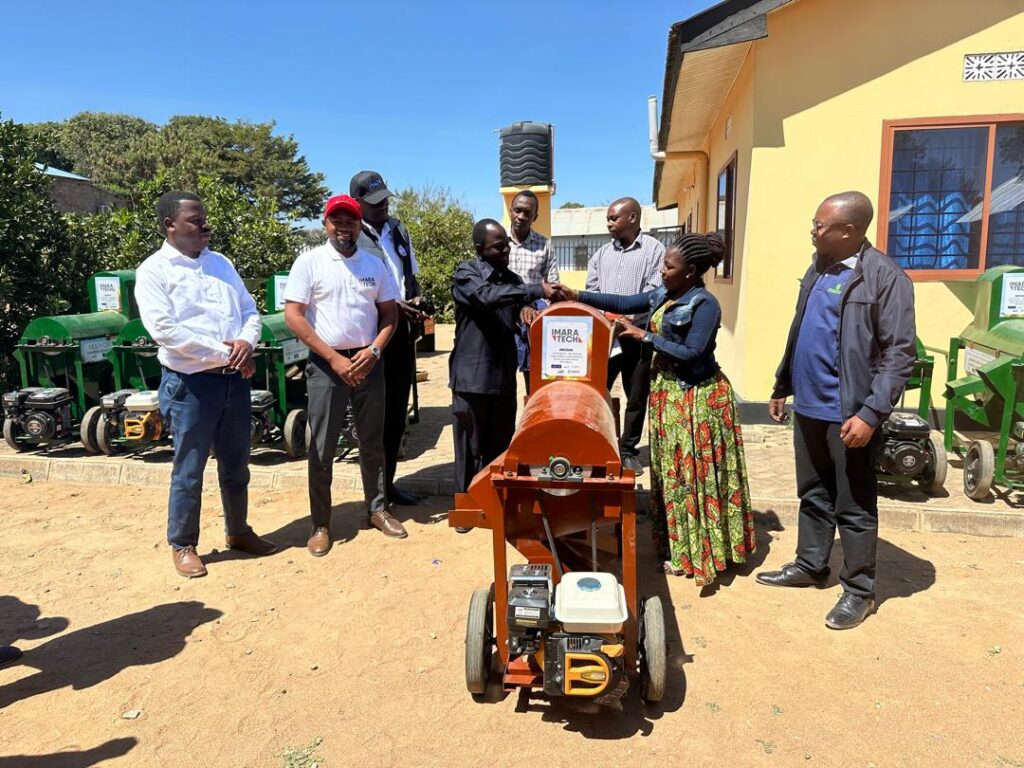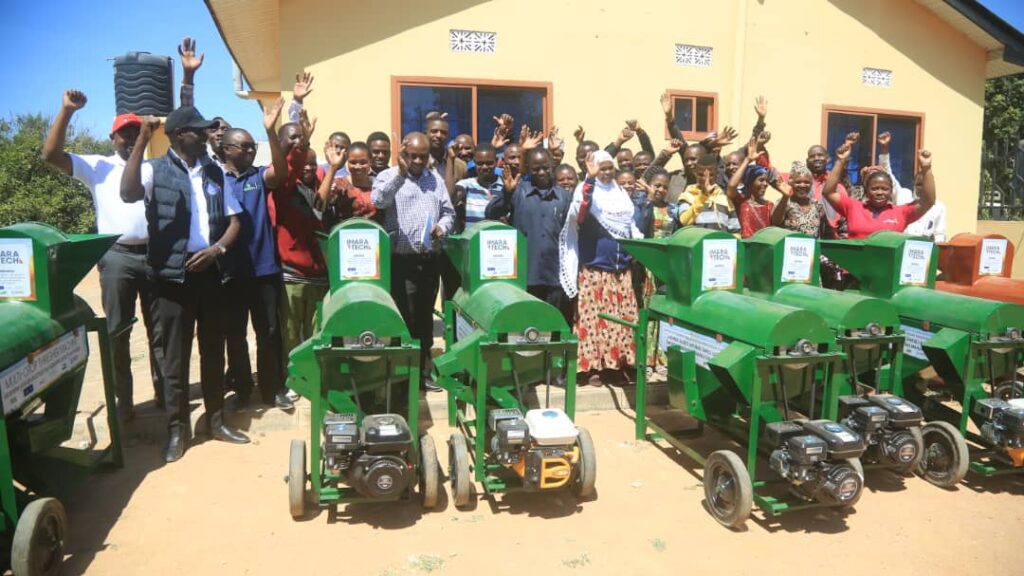By Atupokile Mwakatwila, Justus Ochieng, Radegunda Kessy, Reinfred Maganga, Yohane Chideya & Jean Claude Rubyogo
The Pan-Africa Bean Research Alliance (PABRA-Africa) and Imara Tech (Imara Tech) are launching a new initiative, “Scaling Multi-Crop Threshing Machines for Women and Youth Empowerment project in Tanzania,” in the Singida region. This project aims to reduce labor for women and youth by providing machines that can thresh, shell, and winnow nine different crops, including maize, sunflower, sorghum, millet, finger millet, green grams, pigeon peas, lablab, and beans.
Funded by the United States Agency for International Development (USAID) through the International Maize and Wheat Improvement Center (CIMMYT) and implemented by the Alliance of Bioversity International and CIAT (The Alliance) and PABRA in collaboration with the Tanzania Agricultural Research Institute (TARI), the initiative aims to support Imara Tech in promoting Multi-Crop Threshers (MCTs) manufactured by the company, specifically targeting women and youth in the farming community as service providers.
This is a continuation of PABRA’s support for women and youth-led small and medium enterprises (SMEs), including Imara Tech, to scale up their businesses and, in turn, creating sustainable employment for women and youth in rural Tanzania. In 2019, The Alliance in collaboration with TARI and the Soybean Innovation Lab of Missouri State University, started training local artisans in Tanzania, including the youth-led Imara Tech, in the manufacture of MCTs, to reduce market barriers, alleviate the drudgery faced by women involved in threshing and winnowing crops, diversify enterprise opportunities, enhance livelihood prospects, and decrease pre- and post-harvest losses. Although still unable to fully meet the growing demand, over 800 MCTs have been sold to individual and group threshing service providers.
These MCTs are expected to save labor time, maintain grain quality, and address bottlenecks in the value chain of the nine crops. Currently, according to Imara Tech, Tanzanian smallholder farmers spend 1.35 billion hours and US$28 per ton to manually thresh their crops each year. The widespread adoption of these machines is projected to reduce labor time by up to 1.2 billion hours and decrease costs to US$15 per ton.
To support the rollout of this initiative, the implementing partners, led by The Alliance and Imara, began promoting threshing machines with farmer groups on July 23, 2024. These groups had placed orders following recent sensitization meetings, which included demonstrations of the machines’ functionality, quality, and benefits. The meetings were attended by women and youth farmers’ representatives represented their groups, and partners such as Farm Africa, The Agricultural Markets Development Trust (AMDT), and QSTEK in Singida, Ruvuma, Manyara, Mbeya, Iringa, Njombe, Songwe, Rukwa and Dodoma regions.
Dr. Justus Ochieng, the Project Coordinator from The Alliance and PABRA, who was present at the launch, expressed gratitude to all the farmers for their enthusiasm and commitment in placing orders for the machines through their groups
“The threshing machines are designed to ease the workload of women and youth, who are primarily responsible for labor-intensive tasks that consume a significant portion of their productive time. These machines will also create employment opportunities and generate income for these beneficiary groups, and the project will cover 50% of the cost of these machines to enhance their affordability,” explained Ochieng.

One of the beneficiaries (second right) receiving a multi-crop thresher machine as other partners look on
Assistant Regional Administrative Secretary of Singida Region, Mr. Stanslaus Chowaji, the guest of honor at the event, inaugurated the distribution of threshing machines to 10 out of the 45 interested farmer groups in the region.
Chowaji urged farmers to take good care of the machines, emphasizing that they will benefit not only themselves but also their fellow villagers, who will be able to rent threshing services.
“These machines will reduce labor drudgery, create employment opportunities, and generate income at both the group and individual levels. However, it is also important to properly manage the machines and the income from renting them, including opening a group bank account to save the earnings. This will help cover maintenance costs, which will be necessary over time,” he said.
Imara Tech and the Alliance signed a Memorandum of Understanding to strengthen the collaboration, aiming at bringing the MCT technology closer to the end users. “Our collaboration with The Alliance on this project has been incredibly beneficial, helping us expand our sales and reach areas we might not access on our own. Additionally, it will significantly enhance the quality of our machines through access to modern production technology,” said Alfred Chengula from Imara Tech.

Project implementation partners and beneficiaries pose with multi-crop threshers after the launch at Farm Africa’s office in Singida Region
Pendo Kitundu, a farmer from Iguguno village, attended the launch in the Singida region and expressed her appreciation for the initiative, saying the new machines will address many of the challenges they faced when threshing crops manually.
“For a long time, we have been threshing crops by hand and with sticks among other traditional methods, which led to broken grains and contamination with sand, stones, and residues, causing us to sell grain at prices lower than expected. With these machines, the challenges we face will be heavily reduced by improving the quality and increasing the value of our crop grains,” she said.
The launch event was also broadcast on ITV-Tanzanian National Television. You can view it via the link below:

